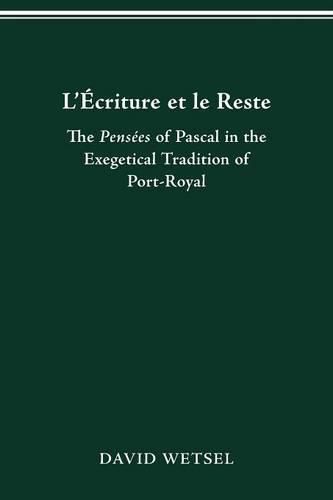Readings Newsletter
Become a Readings Member to make your shopping experience even easier.
Sign in or sign up for free!
You’re not far away from qualifying for FREE standard shipping within Australia
You’ve qualified for FREE standard shipping within Australia
The cart is loading…






This title is printed to order. This book may have been self-published. If so, we cannot guarantee the quality of the content. In the main most books will have gone through the editing process however some may not. We therefore suggest that you be aware of this before ordering this book. If in doubt check either the author or publisher’s details as we are unable to accept any returns unless they are faulty. Please contact us if you have any questions.
Modern critical approaches to the Pensees have often been profoundly influenced by the idea that these notes for Pascal’s projected Apology for Christianity may be divided into two categories: the pensees philosophiques and the pensees religieuses. This distinction has obscured the apologetic character of the proposed Apology by inviting critics to elucidate its purely philosophical meaning, and it has contributed to critical neglect of those passages that are deemed of only theological interest. To point up the true significance of these passages, Dr. Wetsel undertakes a systematic examination of the part played by the Bible in Pascal’s overall argument. He does so from the perspective of biblical exegesis as practiced by the theologians of Port-Royal, and finds of particular value in illuminating previously enigmatic passages of the Pensees that extensive set of commentaries appended to his translation of the Bible by Issac Le Maistre de Sacy, Port-Royal’s chief authority on the interpretation of Scripture and Pascal’s own confessor. In Sacy’s Preface a la Genese, Wetsel has discovered a previously undetected key to Pascal’s whole apologetic strategy. Wetsel establishes a series of parallel texts drawn from the thirty-four volumes of commentary assembled by Sacy. He enables interpretation of ideas that appear in the Pensees only in abbreviated and recondite form, reveals the larger dimensions of an apology based on the argument that God has built into the very fabric of sacred history a convincing proof of Christianity, and illuminates our heretofore imperfect understanding of the cryptic exchange between Pascal’s libertin and the apologist himself that comes at the end of the argument known as le pari:
N'y a-t-il point moyen de voir le dessous du jeu?
Oui, l'Ecriture et le reste. David Wetsel is an Andrew Mellon Fellow in the Department of French and Italian at the University of Pittsburgh.
$9.00 standard shipping within Australia
FREE standard shipping within Australia for orders over $100.00
Express & International shipping calculated at checkout
This title is printed to order. This book may have been self-published. If so, we cannot guarantee the quality of the content. In the main most books will have gone through the editing process however some may not. We therefore suggest that you be aware of this before ordering this book. If in doubt check either the author or publisher’s details as we are unable to accept any returns unless they are faulty. Please contact us if you have any questions.
Modern critical approaches to the Pensees have often been profoundly influenced by the idea that these notes for Pascal’s projected Apology for Christianity may be divided into two categories: the pensees philosophiques and the pensees religieuses. This distinction has obscured the apologetic character of the proposed Apology by inviting critics to elucidate its purely philosophical meaning, and it has contributed to critical neglect of those passages that are deemed of only theological interest. To point up the true significance of these passages, Dr. Wetsel undertakes a systematic examination of the part played by the Bible in Pascal’s overall argument. He does so from the perspective of biblical exegesis as practiced by the theologians of Port-Royal, and finds of particular value in illuminating previously enigmatic passages of the Pensees that extensive set of commentaries appended to his translation of the Bible by Issac Le Maistre de Sacy, Port-Royal’s chief authority on the interpretation of Scripture and Pascal’s own confessor. In Sacy’s Preface a la Genese, Wetsel has discovered a previously undetected key to Pascal’s whole apologetic strategy. Wetsel establishes a series of parallel texts drawn from the thirty-four volumes of commentary assembled by Sacy. He enables interpretation of ideas that appear in the Pensees only in abbreviated and recondite form, reveals the larger dimensions of an apology based on the argument that God has built into the very fabric of sacred history a convincing proof of Christianity, and illuminates our heretofore imperfect understanding of the cryptic exchange between Pascal’s libertin and the apologist himself that comes at the end of the argument known as le pari:
N'y a-t-il point moyen de voir le dessous du jeu?
Oui, l'Ecriture et le reste. David Wetsel is an Andrew Mellon Fellow in the Department of French and Italian at the University of Pittsburgh.